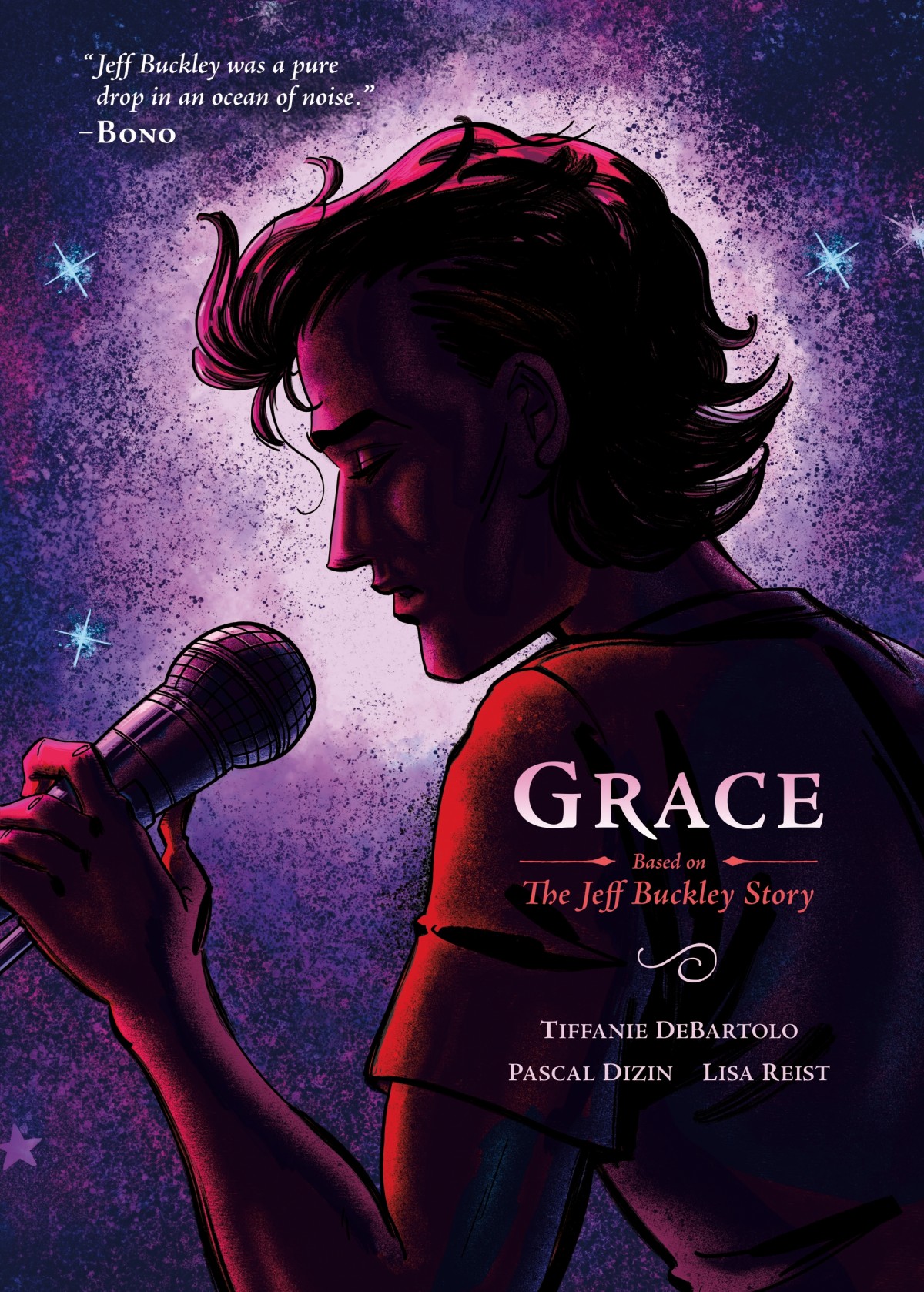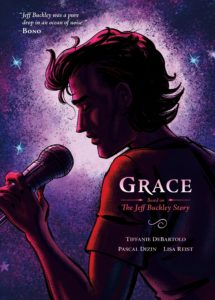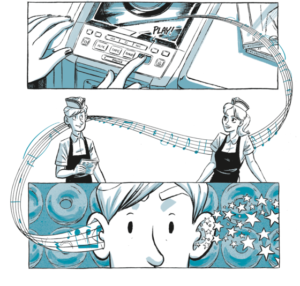GRACE: The Jeff Buckley Story
By Tiffanie DeBartolo, Pascal Dizin, Lisa Reist
This graphic novel just dropped (on April 30) from First Second/Macmillan publishers. And you just have to see the illustration of a young man getting his mind blown on page 6. It’s a great visualization about how music can grab someone from the inside and change their world. The dialog charting Jeff’s experiences early on are highlights that make for great sound bytes (or panels in a graphic novel). In other words, this thing is well done. It’s so fitting that the writer was not previously immersed in the graphic novel genre.
A couple sound byte highlights include:
“I want to be a great songwriter. Not a good one. A great one. A full-fledged poet in my own right.” (not in the shadows of his father…I think he achieved his goal)
“I want to be a twenty-four-hours-a-day guttural output of love.”
Q (from Steve Berkowitz, A&R, Columbia Records): What do you want?
“I want total artistic control… And I want my girlfriend’s cat to like me.”Remember: BE THE BEST
NO NEGATIVITY
NO WEAKNESS
NO ACQUIESCENCE TO FEAR OR DISASTER
NO ERRORS OF IGNORANCE
NO EVASION FROM REALITY
You got it?
I had a chance to talk to the person who put it together — to find out why and also hear more testimony about how special Buckley’s music is.
When did you first hear Jeff Buckley’s music? How did it strike you, effect you?
I didn’t hear Grace for the first time until 1999, two years after Jeff’s death. I was on a flight to Italy with my future husband. We were on our way to Tuscany to find a place to get married. I dropped Grace into my Walkman (remember those?) and within the first 30 seconds of the first song, all the hair on my arms was standing on end. By the time I got to “Lover, You Should’ve Come Over,” I was sobbing. After that, I became obsessed with the album, literally listening to it for nine months straight while I wrote my first novel, God-Shaped Hole.
When did you first hear or discover the story behind the man’s life, music and career?
I started Googling Jeff immediately after falling in love with his music. I read every article and interview I could get my hands on. Unearthed every demo. The fact that Jeff had lived and died before I’d ever known he’d existed was crushing. And his voice blew me away.
What made you want to tell this story?
Well, I originally told it in a very fictionalized version, via my first novel, the aforementioned God-Shaped Hole. Jeff’s mom, Mary Guibert, had been given a copy of that book when it first came out, and she’d appreciated it. So, when the publishers of Grace: Based on the Jeff Buckley Story approached her about doing a graphic novel about the book, she suggested that I write it. I didn’t know much about the graphic novel genre. To be honest, I’d never read a graphic novel prior to taking on this project, but the opportunity to work with Mary on this book, and to get to know Jeff posthumously was too great to pass up.
What are some of the moments that stand out to you?
Definitely reading his journals during my research was a highlight, and a huge gift. His personal writings are such a beautiful glimpse into the extraordinary man that he was. So focused, so talented and thoughtful. But the part that surprised me the most was how funny he was. I think people often imagine Jeff as this brooding guy, and he had his moments of that, for sure. But his spirit was full of joy and mischief too.
What are the details of his death that surprise you or bother you the most? Why?
The most upsetting part for me is how random and accidental it was. The kind of incident that, had he arrived at the shore of the river a minute sooner or a minute later, everything could have been different, you know? Timing is everything. I remember reflecting long and hard on this topic back when I was working on my first book, eventually summing it up like this: “It seemed cruelly unfair to me, even then, how fast your life can change before you have an opportunity to rethink your choices. We should get second chances on the big stuff. We should come equipped with erasers attached to the tops of our heads. Like pencils. We should be able to flip over and scribble away mistakes, at least once or twice during the duration of our existence, especially in matters of life and death.” (God-Shaped Hole)
When and how did the graphic novel medium become the one for you and this story?
Like I said, the idea of a graphic novel about Jeff Buckley was born before I was brought on board. And I’ll tell you what I really loved about the process. Typically, as a novelist, you do your work and then it’s sort of finished. I mean, there’s the editing process, but that’s basically just another phase of the writing process. With this book, I did my work — that is, I wrote the story — and then I got to hand it over to other artists who interpreted my words and my story visually. Once the illustrators were done and I saw the finished project, I reveled in how magical it was to merge my work with their work to create one unique piece of art. It really moved me. I love it.
What’s your favorite SF 49ers memory? Were you there for “The Catch?”
I was there for “The Catch”! I was only 10 at the time, but I remember it vividly, and it’s definitely one of the greatest 49er memories I have. No one thought we were going to win that game, and when I tell you, the amount of joy it brought to the entire city of San Francisco—people still talk about it today with tears in their eyes, 38 years later. Another big football memory I have is Super Bowl XXIII in 1989. The last drive of the game, Joe Montana threw the ball to John Taylor, who scored with 34 seconds left. It was very dramatic and exciting.
What sort of strife would it cause in your family if you cheered for the Dallas Cowboys?
Ha ha ha! Honestly, coming from me, it probably wouldn’t have caused any strife at all. Just a lot of eye-rolling. I’m sort of the weird one in the family, the only one who’s not super into sports, and my parents and sisters probably would have just shored it up to Tiffanie being Tiffanie. My old love of the 49ers really came from my love for my family and the family-like relationships we had with the players growing up. I rooted for them because I knew and loved them as people, but once my dad got out of football, I stopped paying attention.
When writing a graphic novel (or any story for that matter – but especially one so relatively short), how do you know what parts to leave out?
It’s a tough question. I never leave anything out when I’m writing the rough draft. Therefore, it really becomes an issue of editing. And I think any writer will tell you that the most difficult part of editing is letting go of good stuff. Sometimes I write a sentence, a page, or a whole chapter that I know is good, or moving, or interesting, but when I get to the editing process, I find that this particular section doesn’t necessarily need to be there, you know? That’s when editing gets painful. I’m an economical writer. I like prose that’s succinct and straightforward, and the question I always ask myself when I’m editing is: Does this serve the story I’m trying to tell? And if the answer to that question turns out to be No, I delete it. And then I cry and have a little word funeral.
How hard is it to cut something cool from the story? Got an example of a part or mini-storyline that you had to leave on “the cutting room floor?”
It’s hard! My very first draft of GRACE was over twice as long as the book ended up being. Jeff had a short but fascinating life, and originally there were a lot more details in it, mainly about his childhood and his romantic life. And when I turned in my work, the publisher said, This is so fantastic, but we need you to cut about 100 pages! (laughs).
Prior to this story, had you ever tried to know somebody from second-hand stories? How do you formulate an idea or begin to fathom who someone is or describe them when you’ve never met them? I’m curious how much of a challenge that was.
I love this question, especially in relation to Jeff, because even before I was brought on to this project, I had a sense that I knew Jeff. Not literally, obviously. But he was an artist that put a lot of himself into his work, and that made me feel a deep connection to him. I formed a lot of notions about who he was. Cut to a few years later, after I was hired to write the text to GRACE, I started to research him, and I began to discover that most of my perceptions of him were pretty spot on. The real challenge for me was how to convey who he was in a way that would please him. All throughout the writing, I was very conscious of that. Would Jeff approve of this? Would he like it? That was a big part of my process. I think it was Stephen King who once said that every book is actually a love letter to one person. This book was a love letter to Jeff.
God-Shaped Hole is a concept that our Creator made each of us with a void that only He can fill. How does that concept shape any of your work (if at all)?
Another really great question. Although I’d clarify that my definition of the concept doesn’t have such a strong religious connotation. As far as I’m concerned, God can’t fill the void any better than a lot of other crutches. From my point of view, God is just another crutch — a human construct concocted to help us cope with the mysteries and sorrows of existence. In my first novel, God-Shaped Hole, the main character has a theory that all humans have these big, gaping holes in our souls, and life is a constant search to try to fill them up. Some people use God and religion to fill the void, some people use drugs or alcohol, or work, or donuts, or shoes. The list goes on and on. But it’s all the same thing, really. We’re all trying to figure out how to escape our sorrows. I’m certainly no exception to that. I happen to write to fill the void, and to search for answers about what the void actually is.
Great job on the graphic novel. Anything else you’d like to add?
Just a big thank you for your time and interest in this book. It’s a story that touches me deeply, and I hope it touches others as well. Also, your questions were dope. 🙂




Comments